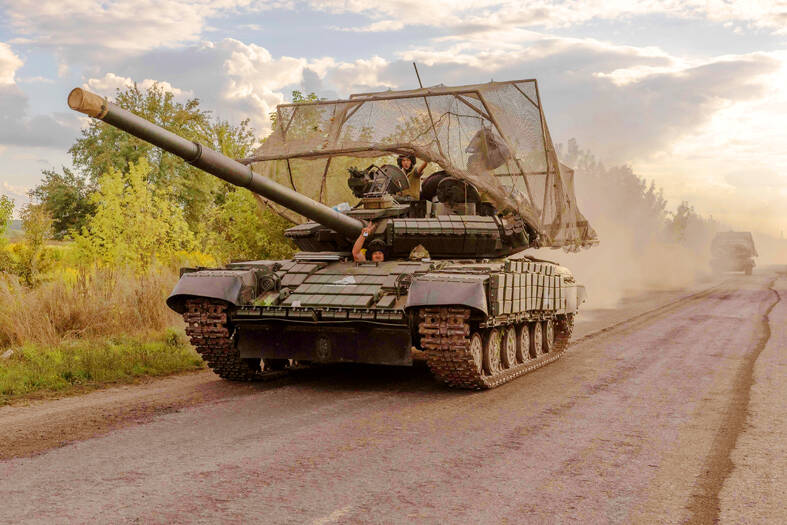Russia yesterday ordered more evacuations in a region bordering Ukraine as it battled to contain an unprecedented push onto its territory by Kyiv’s forces.
Ukraine last week sent troops into Russia’s border region of Kursk, in the largest cross-border operation by Kyiv since Moscow launched its offensive more than two years ago.
The assault, which has sent tens of thousands of people fleeing, marked the most significant attack by a foreign army on Russian territory since World War II.

Photo: AFP
A top Ukrainian official said that the operation was aimed at stretching Moscow troops and destabilizing the nation after months of slow Russian advances across the front line.
The assault appeared to catch the Kremlin off guard, with Moscow’s army rushing in reserve troops, tanks, aviation, artillery and drones in a bid to quash it.
Despite the efforts, the army on Sunday conceded that Ukraine had been able to penetrate its territory by up to 30km in places.
In a daily briefing on the situation in the western Kursk region, the Russian Ministry of Defense said that it had “foiled attempts” by Ukraine’s forces to “break through deep into Russian territory” using armored vehicles, but it said that some of those forces were near the villages of Tolpino and Obshchy Kolodez, about 25km and 30km from the Russia-Ukraine border.
A Ukrainian security official said on condition of anonymity that “the aim is to stretch the positions of the enemy, to inflict maximum losses and to destabilize the situation in Russia as they are unable to protect their own border.”
The Ukrainian official also said Russian claims that Kyiv had deployed 1,000 troops were a serious underestimate.
“It is a lot more,” he said. “Thousands.”
Russia yesterday ordered fresh evacuations in the region, moving people from the neighboring region of Belgorod.
“The enemy is active on the border of the Krasnoyaruzhsky District,” Vyacheslav Gladkov said on Telegram. “For the health and security of our population, we’re beginning to move people who live in Krasnoyaruzhsky to safer places.”
On Sunday, each nation blamed the other for a fire at the Zaporizhzhia nuclear power plant in southern Ukraine occupied by Russian forces, though both sides — and the UN’s nuclear watchdog — said there was no sign of a nuclear leak.
“No impact has been reported for nuclear safety,” said a statement from the International Atomic Energy Agency (IAEA), which has experts at the site.
Both Kyiv and Moscow said there had been no rise in radiation levels.
In a later statement, the IAEA said it had requested that its team get “immediate access to the cooling tower to assess the damage.”
A Moscow-installed official, Vladimir Rogov, said that the blaze had been “completely extinguished” in a Telegram post yesterday.

Airlines in Australia, Hong Kong, India, Malaysia and Singapore yesterday canceled flights to and from the Indonesian island of Bali, after a nearby volcano catapulted an ash tower into the sky. Australia’s Jetstar, Qantas and Virgin Australia all grounded flights after Mount Lewotobi Laki-Laki on Flores island spewed a 9km tower a day earlier. Malaysia Airlines, AirAsia, India’s IndiGo and Singapore’s Scoot also listed flights as canceled. “Volcanic ash poses a significant threat to safe operations of the aircraft in the vicinity of volcanic clouds,” AirAsia said as it announced several cancelations. Multiple eruptions from the 1,703m twin-peaked volcano in

Farmer Liu Bingyong used to make a tidy profit selling milk but is now leaking cash — hit by a dairy sector crisis that embodies several of China’s economic woes. Milk is not a traditional mainstay of Chinese diets, but the Chinese government has long pushed people to drink more, citing its health benefits. The country has expanded its dairy production capacity and imported vast numbers of cattle in recent years as Beijing pursues food self-sufficiency. However, chronically low consumption has left the market sloshing with unwanted milk — driving down prices and pushing farmers to the brink — while

China has built a land-based prototype nuclear reactor for a large surface warship, in the clearest sign yet Beijing is advancing toward producing the nation’s first nuclear-powered aircraft carrier, according to a new analysis of satellite imagery and Chinese government documents provided to The Associated Press. There have long been rumors that China is planning to build a nuclear-powered aircraft carrier, but the research by the Middlebury Institute of International Studies in California is the first to confirm it is working on a nuclear-powered propulsion system for a carrier-sized surface warship. Why is China’s pursuit of nuclear-powered carriers significant? China’s navy is already

‘SIGNS OF ESCALATION’: Russian forces have been aiming to capture Ukraine’s eastern Donbas province and have been capturing new villages as they move toward Pokrovsk Ukrainian Commander-in-Chief Oleksandr Syrskyi on Saturday said that Ukraine faced increasing difficulties in its fight against Moscow’s invasion as Russian forces advance and North Korean troops prepare to join the Kremlin’s campaign. Syrskyi, relating comments he made to a top US general, said outnumbered Ukrainian forces faced Russian attacks in key sectors of the more than two-and-a-half-year-old war with Russia. Ukrainian President Volodymyr Zelenskiy in a nightly address said that Ukraine’s military command was focused on defending around the town of Kurakhove — a target of Russia’s advances along with Pokrovsk, a logistical hub to the north. He decried strikes